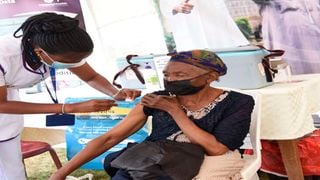
Ms Mary Kusa, 63, receives a Covid-19 shot at the deputy county commissioner’s office in Dagoretti, Nairobi County, on January 3, 2022 during the launch of mass vaccination drive.
| Evans Habil | Nation Media GroupNews
Premium
Global Covid-19 jabs target a faint mirage for Kenya
What you need to know:
- WHO had set a target of inoculating at least 40 per cent of the global population by the end of December 2021.
- Only 0.13 per cent of the more than 10.1 billion vaccine doses made available globally have been administered in Kenya.
Kenya is still far from hitting the World Health Organization’s (WHO) Covid-19 vaccination target, more than 12 months since the arrival of the first vaccine doses into the country.
The WHO had set a target of inoculating at least 40 per cent of the population of all countries by the end of December last year and 70 per cent by mid this year.
Kenya has, however, fully vaccinated only 5.8 million adults, against the government’s target of fully vaccinating 19 million adults (equivalent to 70 per cent of the adult population) by end of June 2022 and the entire adult population of 27 million people by the end of the year.
One is considered fully vaccinated after receiving two doses of AstraZeneca, Pfizer, Moderna or Sinopharm or one dose of Johnson and Johnson.
It is also unclear how the Ministry of Health plans to fully vaccinate 29 million teenagers – aged 15 to 17 years, or 50 per cent of the population – given that so far, only 11,426 teenagers have been fully vaccinated and 119,714 partially vaccinated.
The country intends to inoculate 5.8 million teenagers by end of December 2022.
Kenya’s vaccination programme for adults was rolled out in March 2021 while the teenage population plan, which utilises the Pfizer vaccine, began in November, 2021.
Fully vaccinated
“Kenya has laid out plans to administer at least 20 million vaccine doses between January and June 2022 so as to achieve the mid-year target and has set specific targets for each of its 47 county governments with the objective of ensuring the administration of vaccine doses according to their population proportions,” notes the Ministry of Health.
The latest daily situation report shows that only 0.13 per cent (or 12,885,157) of the more than 10.1 billion vaccine doses made available globally have been administered in Kenya.
The report further indicates that only around 21.6 per cent of Kenyans are fully vaccinated, compared to more than 60 per cent in many high-income countries.
The country still has more than 11.8 million unutilised doses having so far received total vaccine doses of 24.6million. 3.7 million doses are still at the Kitengela central vaccine store.
The Health ministry has, however, clarified that none of the vaccines received to date has expired.
Besides vaccine hesitancy, slow vaccine rollout and uptake in Africa has been blamed supply constraints, structural issues and logistical barriers.
Unpredictable supply
New research by the African Union’s Partnership for Evidence-based Response to Covid-19 (Perc) published points out a number of hindrances to higher vaccine coverage on the continent.
Unpredictable supply – in terms of volumes, timing and shelf life – continues to threaten countries’ ability to meet demand. The report notes that getting a jab is in most cases inconveniencing; requiring people to travel far or visit vaccination sites at inopportune times.
As a result, many African countries whose Covid-19 vaccine supply increased recently are grappling with slow uptake of the jabs, which poses a threat to the vaccines’ shelf life.
“All our doses are still within their viability timelines. The challenge we may face, however, might arise from the in-vial expiry, especially for Moderna and Pfizer vaccines, because these doses have been made in such a way that once opened, their expiry dates are significantly shortened,” said Dr Willis Akhwale, the National Covid-19 Vaccines Task Force chairperson in a recent interview.
Dr Akhwale also explained to the Nation that the Health ministry had resolved not to accept any donations whose expiry date is less than 90 days.
The WHO estimates that Africa faces a US$1.3 billion (about Sh147.5 billion) shortfall in operational costs, including the cost of cold-chain logistics, travel, vaccinators and supervisors, as well as a looming shortage of syringes and other crucial commodities.
“Many challenges could be better tackled with reliable funding, including training of vaccinators and ensuring sufficient support staff, improving the software for data capture and making sure that every country has enough freezers and logistics elements,” the UN health agency notes.





